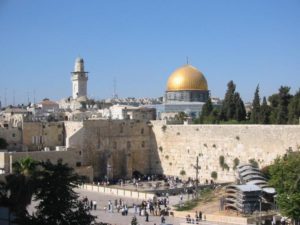 Print this Article
Print this Article

Patrolling the Har HaBayit may entail a rigorous Halachic protocol
By Rav Yosef Fund, Posek for the Bet HaVa’ad
Visiting Har HaBayit – the Temple Mount – is all the “rage” these days, as many Jews from diverse backgrounds are now taking advantage of the limited access they are afforded to our holiest site. This has sparked an outrage among Muslims, who have been violently opposed to a Jewish presence on the Temple Mount, harassing and even stabbing some Jewish visitors, enforcing a Jewish prayer ban in the area, and attempting to pass a UN resolution that would deny any Jewish ties to the Har HaBayit.
Whether it is permissible to visit any part of the Har HaBayit in our current state of Tum’at Met is a subject of debate among the Poskim, and there are surely areas within the Har HaBayit which are out-of-bounds according to all authorities. However, soldiers or police officers who for security reasons are assigned to patrol the Har HaBayit may have to bear in mind a few very important Halachot.
A Desolate Mikdash
We are commanded1: “My Mikdash you shall fear”. Hachamim explain2 that this requires one to behave in a respectful way in the Bet HaMikdash. In the words of the Mishna: “One should not enter the Temple Mount with his staff, his shoe, his money belt, nor the dust on his feet, and should not use it as a shortcut, and certainly not spit”.
The Rambam3 maintains that even when the Bet HaMikdash is desolate it maintains its sanctity. [The Ra’avad4 disagrees and maintains that nowadays whoever enters the Bet HaMikdash is not liable for Karet5.] Nowadays, in the absence of water from the Para Aduma, all are considered Tame Met – having contracted impurity from the dead. The Halachic codifiers6, in accordance with the opinion of the Rambam, rule that any who enter the Bet HaMikdash in such a state is liable for Karet.
Preparing for the Post
Regarding soldiers and police officers, because their work can fall under the category of Pikuah Nefesh, entering the Mekom HaMikdash would certainly be permitted and even called for7. However, a soldier or police officer doing so may still be required to do what is possible to mitigate Hillul Mikdash. There are a number of laws regarding a person’s conduct prior to entering and while in the Bet HaMikdash, and the soldier or officer should fulfill them to the greatest extent possible. He is required before entering the area of the Bet HaMikdash to immerse in a kosher Mikve, and to recite the blessing of “Al HaTevila”. When necessary he should do so even on Tishah B’Av and Yom Kippur8.
Furthermore, he should remain in the Makom HaMikdash only as long as necessary and leave as soon as his duty is completed. The Rambam9 writes “all who enter the Azara should walk gently in the area where it is permitted for him to enter, and should see himself as standing before G-d … and walk with fear and trembling”. However, in our instance where the individual in question is assumed to be Tame Met, it would seem that hurrying out would be desired.
Special Attire
It is forbidden to bring articles that are impure into the Bet HaMikdash10, and nowadays a person’s clothing is impure, therefore the soldier or officer should not wear extra clothing. This includes not wearing his Talit Kattan, watch, and any other items not necessary for security reasons. Rav Yitzhak Silberstein suggests dressing in nylon, which according to many authorities is not susceptible to Tum’a.
It is forbidden to wear leather shoes in the Bet HaMikdash (the Kohanim performed the Avoda barefoot). The Minhat Hinuch11 expresses uncertainty as to whether others who enter the Bet HaMikdash must do so barefoot, or may wear socks and the like. Nowadays, if for security reasons it is preferable that the soldier or police officer wear shoes, this would certainly be permitted.
Drinking, Haircuts, Chatter
It is forbidden to enter the Bet HaMikdash drunk, with torn clothing, or with overgrown hair12. Therefore, if a person’s hair is overgrown he should take a haircut. It is worth noting that the Rambam13, in a case of an Yisra’el (non-Kohen) limits the violation of Perua Rosh (uncut hair) to when it is “derech nivvul” – disgracefully uncut hair; this would imply that long hair which is properly groomed may not be an issue14.
Another area of conduct in the Bet HaMikdash relates to manners of speech. The Aruch HaShulchan He’Atid15 states that since Hazal require one to act in the Mikdash as if before a king, chatter or even any words of Reshut would be forbidden. Therefore, soldiers and police officers should limit their conversations to matters related to their duties.
Taking the Heat
An interesting question has been raised amongst soldiers who observe Mitzvot: is it preferable for them to try to not be assigned to the Har HaBayit? Or perhaps it is preferable that they be the ones to serve rather than those who will not observe the Halachot properly?
Sources:
[2] Berachot 54a, Rambam Bet HaBehira ch. 7.
[5] Commentators discuss the scope of the disagreement between the Rambam and Ra’avad, with some suggesting that it is limited to whether there is the liability of Karet, but not that Ra’avad would permit entering.
[6] Magen Avraham 561, 2, Mishna Berura ibid 5, Likute Halachot 66b.
[7] Shu”t Ohr L’Tziyon Vol. 3 30:4, Mishkan Shilo page 336, Rav Yitzhak Silberstein in Shabbat Shabbaton section 140, and as cited in Sha’are Nehama pg. 142. The following discussion is primarily based on these works, even when not explicitly cited.
[10] Rambam Bi’at Mikdash 3, 16.
[12] Rambam Bi’at Mikdash ch. 1.
[14] See Ohr L’Tziyon for a discussion of this point.
[15] Hilchot Bet HaMikdash 14, 5.